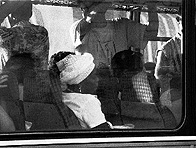
Riding bus in Cuba is an industrious endeavor.
Many
people waited for a bus that was filled with other people

A woman stared at the tourist for a handout
|
|
|
Dec. 20, 1999
10:00am Radio Havana
It was our last day in town. This morning I went to Radio
Havana office located at the Radio Progresso building.
I walked through a pair old unwashed glass doors. A male clerk sat
behind a wooden desk that occupied by a few phones with the rotary dial.
I asked him if I could speak to Mariley, a journalist who I met several
days earlier. He dialed and passed on a few words. Then he
handed me the phone. Mariley came on on the other end. She
told me to wait while she came down.
We ascended a flight of stair that led to a dimly lit hall. I
followed Mariley to the newsroom. It was a humble experience realizing
that it was there where news from Cuba broadcast to the world. The aging
office, occupied by primitive equipment and machines, struggled in a world
advancing by high technology.
Mariley led me to her desk. In the same office, several journalists
sat behind computers that normally extinct in the U.S. typing away. Mariley
reached down for the mouse and saved her work. Immediately followed
her intuitive move, the lights blinked. In Cuba the delivery of electricity
was inconsistent. Same problem went for the phone system. Sometimes,
the connection was so bad, the voice from the other end sounded like a mosquito's
cry.
One thing for certain, the impact of the Trade Embargo has not diminished
their spirits and prides. Cuba remained as one of a several
few communist state in the world. Although, facing enormous economic
pressure and entering for some the twilight years, Fidel Castro is still
in control. He manages to inspire a nation to believe in his
socialism and revolution ideology.
On my fly back from Cuba, although exhausted
due to the delay, I thought most about the timing our trip and how it coincided
with the political tug-of-war over the six-year-old Elian. I thought
about my original intention of staying out of political issues.
I thought about Patch’s words of “every moment is a political moment.”
Politics, no matter how much I tried to avoid, were the center of the trip. The little
boy Elian controversy has plastered news headline. The Cuban American community
in Miami infused it with their protest. Cubans responded with demonstration.
And the media jumped in.
While the media hoopla was swirling around
the custody fight of a boy, many Cubans who I talked to seemed to want
democracy and an end to the trade embargo to appear on the current affairs
instead. Meanwhile, they moved along in the shadow of obscurity hoping
the name Elian would remind the world of their fate. Many might have
view this island as a deserted prison of a fallen communist theology. But
in my view it is a paradise lost in the modern chaos.
|
|